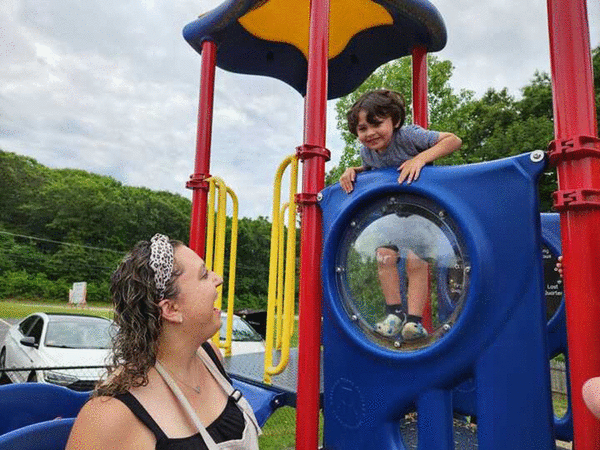For child care workers, state aid for their own kids' care is 'life-changing'

Source: ArcaMax
SMITHFIELD, R.I. -- Child care worker Marci Then, 32, looked over at two 4-year-olds in her care who were tussling over a toy plate in a model kitchen set. "Are we sharing?" she gently asked them. They both let go.
Then works at Little Learners Academy child care center near Providence, Rhode Island. Her daughter, Mila, 4, is enrolled there, so Then is able to keep a watchful eye on her in addition to about a dozen other 4-year-olds. Mila calls her mother "Miss Marci" at school, but "Mom" at home.
Most of the time, Mila is in another room with a different worker at the center, adhering to rules that don't allow parent caregivers to watch their own children in a licensed setting. But for today, Mila is around her mom for a bit to show a reporter around.
Mila proudly chirps her age, then helps put toys away so the kids can quietly gather for circle time.
Then said that without help she would not have been able to afford the $315 a week for Mila to come to Little Learners. But she is taking advantage of a one-year state pilot program that authorizes the use of federal funds to pay for care for the children of early education workers.
"It's been life-changing for me," said Then, a single mom who is also responsible for a disabled young adult whom she adopted. Without it, "I'd have to rearrange my life."
In 2022, Kentucky lawmakers changed the employer child care assistance program to specifically include child care workers at all income levels who work at least 20 hours a week. Other states, including Rhode Island, have since launched programs modeled after the one in Kentucky. The Kentucky program was to end Sept. 30, but Stephanie French, spokesperson for the state's Cabinet for Health and Family Services, wrote in an email that the state will be using a combination of federal and state funding to continue the program.
At least half a dozen states now have similar programs or are considering legislation to start them, according to EdSurge, a news site that covers education issues.
Supporters, including Republicans and Democrats, see retaining child care employees as a benefit not only to the workers and the centers facing worker shortages, but also to the states' economies. For many people, the lack of affordable child care is a barrier to joining the workforce.
Charlene Barbieri, founder and owner of four Little Learners Academy locations in Rhode Island, said in an interview that it is difficult to hire and keep qualified employees. The child care subsidy program helps, she said.
...continued
